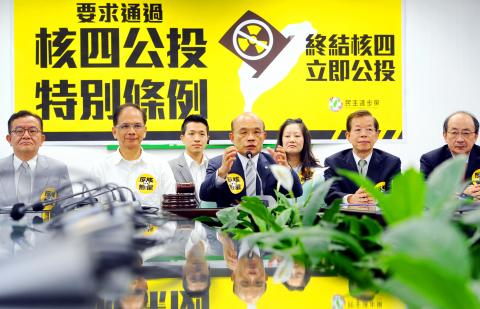The Democratic Progressive Party (DPP) yesterday said it plans to propose a special statute that will pave the way for a national referendum to resolve the decades-long controversy over the Fourth Nuclear Power Plant in New Taipei City’s Gongliao District (貢寮).
DPP Chairman Su Tseng-chang (蘇貞昌) announced the plan at a press conference after it was approved at the party’s weekly Central Standing Committee meeting, saying that stopping the construction of the plant has always been a party goal.
“A nuclear-free homeland has always been part of the DPP charter and our position remains unchanged,” Su said, adding that the 2011 Fukushima Dai-ichi nuclear power plant accident in Japan has only added urgency to achieving this goal.

Photo: Lo Pei-der, Taipei Times
The DPP’s legislative caucus is to propose a special statute calling for a referendum on the Fourth Nuclear Power Plant (核四公投特別條例) to bypass the Referendum Act (公投法), which has been described as a “birdcage act” with its high threshold and perceived unfair regulations.
The proposal would change the threshold to a simple majority. Current regulations require the participation of 50 percent of eligible voters, half of whom must cast a “yes” vote for the referendum to pass.
The special statute would also require that the referendum question be simple, asking voters whether they support or oppose the plant’s construction, Su said, adding that previous proposals on the matter had a clear political agenda.
A referendum question proposed by Chinese Nationalist Party (KMT) lawmakers last year asks: “Do you agree that the construction of the Fourth Nuclear Power Plant should be halted and that it should not become operational (你是否同意核四廠停止興建不得運轉)?”
Given the current high threshold, the referendum is unlikely to pass, thus rendering the government’s plan to put the plant into operation legitimate, critics have said.
The DPP would also demand that the referendum be held by the end of this year, Su said.
He said the DPP initiative was made in response to former DPP chairman Lin Yi-xiong (林義雄), who announced on Tuesday that he is to go on an indefinite hunger strike on Tuesday next week to urge the government to halt construction of the power plant.
Lin also called on society to make whatever effort necessary to warn President Ma Ying-jeou’s (馬英九) administration against defying mainstream public opinion.
In addition, the DPP will organize anti-nuclear mass rallies across the country and ask all candidates in the seven-in-one elections to include the anti-nuclear campaign in their platform, Su said.
Separately, Su proposed a provisional party platform initiative in response to society’s demand for “new politics” following the just-concluded Sunflower movement.
The three-stage plan, which was approved by the Central Standing Committee, calls on the party to gather opinions from a wide range of people and organizations by the end of this month before engaging in extensive discussions and formulating feasible plans next month.
The final stage would be a task for the next DPP chairman, who will be selected in the chairmanship election next month.
Su has said he is not seeking re-election as chairman.

Taiwan has received more than US$70 million in royalties as of the end of last year from developing the F-16V jet as countries worldwide purchase or upgrade to this popular model, government and military officials said on Saturday. Taiwan funded the development of the F-16V jet and ended up the sole investor as other countries withdrew from the program. Now the F-16V is increasingly popular and countries must pay Taiwan a percentage in royalties when they purchase new F-16V aircraft or upgrade older F-16 models. The next five years are expected to be the peak for these royalties, with Taiwan potentially earning

STAY IN YOUR LANE: As the US and Israel attack Iran, the ministry has warned China not to overstep by including Taiwanese citizens in its evacuation orders The Ministry of Foreign Affairs (MOFA) yesterday rebuked a statement by China’s embassy in Israel that it would evacuate Taiwanese holders of Chinese travel documents from Israel amid the latter’s escalating conflict with Iran. Tensions have risen across the Middle East in the wake of US and Israeli airstrikes on Iran beginning Saturday. China subsequently issued an evacuation notice for its citizens. In a news release, the Chinese embassy in Israel said holders of “Taiwan compatriot permits (台胞證)” issued to Taiwanese nationals by Chinese authorities for travel to China — could register for evacuation to Egypt. In Taipei, the ministry yesterday said Taiwan

Taiwan is awaiting official notification from the US regarding the status of the Agreement on Reciprocal Trade (ART) after the US Supreme Court ruled US President Donald Trump's global tariffs unconstitutional. Speaking to reporters before a legislative hearing today, Premier Cho Jung-tai (卓榮泰) said that Taiwan's negotiation team remains focused on ensuring that the bilateral trade deal remains intact despite the legal challenge to Trump's tariff policy. "The US has pledged to notify its trade partners once the subsequent administrative and legal processes are finalized, and that certainly includes Taiwan," Cho said when asked about opposition parties’ doubts that the ART was

If China chose to invade Taiwan tomorrow, it would only have to sever three undersea fiber-optic cable clusters to cause a data blackout, Jason Hsu (許毓仁), a senior fellow at the Hudson Institute and former Chinese Nationalist Party (KMT) legislator, told a US security panel yesterday. In a Taiwan contingency, cable disruption would be one of the earliest preinvasion actions and the signal that escalation had begun, he said, adding that Taiwan’s current cable repair capabilities are insufficient. The US-China Economic and Security Review Commission (USCC) yesterday held a hearing on US-China Competition Under the Sea, with Hsu speaking on